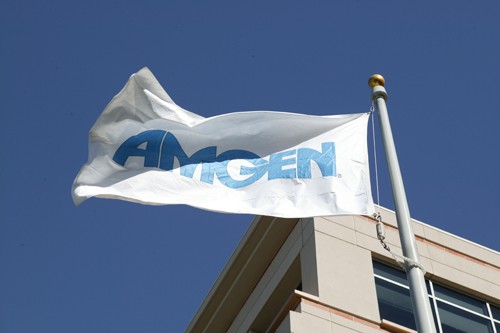
Amgen’s ovarian cancer candidate trebananib has failed to show an improvement in overall survival in a phase III trial, although it did meet other efficacy objectives.
Trebananib is a recombinant peptide-Fc fusion protein – dubbed a ‘peptibody’ – that inhibits the interaction of a receptor on endothelial cells called Tie2 with two growth factors (angiopoietin 1 and 2) that encourage the development of new blood vessels as well as lymph ducts.
Adding trebananib to chemotherapy is designed to block the process and work in tandem with the cancer cell-killing effects of the other drugs to impede the growth and spread of tumours.
In the phase III study – called TRINOVA-1 – trebananib plus paclitaxel was compared to paclitaxel alone in women with recurrent platinum-resistant ovarian cancer. The median overall survival was 19.3 months for the combination, compared to 18.3 months for paclitaxel alone, which was not a statistically significant difference.
Amgen and development partner Takeda – which has rights to the drug in Japan – said the result was disappointing, but stressed this was just the first of three phase III trials of the drug.
The two companies can be encouraged by previously-reported data from the trial showing that adding trebananib to the chemotherapy did extend progression-free survival (PFS) from 5.4 months to 7.2 months, which was actually the primary outcome measure in the trial.
Sean Harper, Amgen’s head of R&D, said: “We continue to explore the potential of trebananib’s novel anti-tumour mechanism of action in other cancer settings.”
Another trial called TRINOVA-2 is evaluating whether trebananib plus pegylated liposomal doxorubicin (PLD) is superior to placebo plus PLD as measured PFS in recurrent epithelial ovarian, primary peritoneal or fallopian tube cancer.
Meanwhile, TRINOVA-3 will compare trebananib to placebo in combination with paclitaxel and carboplatin in the first-line treatment of epithelial ovarian, primary peritoneal or fallopian tube cancer.
The optimistic spin on the results runs a little counter to comments made by Harper in the wake of the American Society of Clinical Oncology (ASCO) meeting in the summer, when he described the overall survival data from TRINOVA-1 as a “binary event” for the trebananib programme.
“If it’s positive it will great [as] it’s a huge unmet need,” he said, according to a SeekingAlpha.com transcript of the meeting. “If not, that will probably represent the end of investment in trebananib.”
The ovarian cancer market has been poorly served with new therapies in recent years, but there are signs of an uptick with the recent green light for Roche’s Avastin (bevacizumab) in platinum-resistant recurrent ovarian cancer in Europe.
Other candidates coming through the pipeline include Boehringer Ingelheim’s triple angiokinase inhibitor nintedanib, Merck & Co’s anti-folate drug vintafolide, AstraZeneca’s PARP inhibitor olaparib and Array BioPharma/Novartis’s MEK inhibitor MEK162.
Another encouraging candidate – GlaxoSmithKline’s kidney cancer therapy Votrient (pazopanib) – was dropped for ovarian cancer earlier this year after disappointing trial data.




